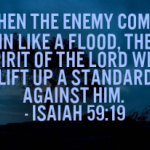 Let me start by briefly commenting on the question - “Where is God when I suffer unjustly?” Answer - “He’s in the same place He was when His Son, our Lord and Savior, Jesus Christ, was dying a horrific death on the Cross.” He was there, in the midst of the suffering, right beside Jesus, weeping along with Mary.
Let me start by briefly commenting on the question - “Where is God when I suffer unjustly?” Answer - “He’s in the same place He was when His Son, our Lord and Savior, Jesus Christ, was dying a horrific death on the Cross.” He was there, in the midst of the suffering, right beside Jesus, weeping along with Mary.Understand, that He was weeping. Understand the pain that a parent feels when they witness the suffering of their child. God the Father was going through a hell all His own during those moments, and the years prior to those moments when Jesus was falsely accused and attacked and called a fool and a devil.
I don’t think it would be accurate to say that God was incapable of intervening. Of course He was. He is God after all! But there was a bigger picture to that suffering than just the moments of pain themselves. Had not Jesus Himself earlier said: “The Son of Man must suffer many things . . . . He must be killed and on the third day be raised to life?” (Lk 9:22)
Of course, pain causes us to focus intensely on the moment and Jesus was no different than we are when we’re hurting. He cried out in anguish to the Father, asking why He had been forsaken by Him, because at the point of pain, the One who we count on to protect us genuinely seems absent or unconcerned. Jesus experienced that. “For we do not have a high priest who is unable to sympathize with our weaknesses, but we have One who has been tempted in every way, just as we are - yet was without sin. Let us then approach the throne of grace with confidence, so that we may receive mercy and find grace to help us in our time of need.” (Heb 4:15-16)
We do the same thing Jesus did - in moments charged with the loneliness of pain, we cry out to God in blind anguish. And God understands our doing that.
However, usually when we ask the question, “Where is God when I’m suffering unjustly?”, what we’re wanting to know more than anything is - “Why doesn’t God intervene to stop it when I suffer unjustly?” Most of us have heard other people recall incidents where God miraculously intervened to rescue them from some terrible disaster.
How many of you have ever seen the “700 Club”? So, you know what I’m talking about then. And by this I mean no criticism of the testimonies on the “700 Club”. I gave one there myself some years ago. Sat right next to Pat. Told my story. And people called in droves to give their life to Jesus. Praise God for the “700 Club”!
But still, if you aren’t one of those set free when Pat or Ben prays for God to deliver people from their bondage, you inevitably ask yourself: “If God intervened for them, then why isn’t He intervening for me? I’d like to know!”
Not knowing the answer to that can give you quite an inferiority complex if you let it.
What I don’t see, however, in my emotional response to this apparent inequity, is that my question is actually a charge against the character of God. It reflects some doubt that He is really good - “the core of all sin”, according to Oswald Chambers. My question reflects the fact that I don’t really know God very well yet. I haven’t spent the time needed to get to know Him intimately. For when that level of “knowing” happens, this question virtually pales into oblivion.
Now, if I was God and the creatures that I died to save persisted in doubting my goodness, I’d slam ‘em up side some planet! But God doesn’t have the pride that I have. He is purely humble, and turns the other cheek when our pain causes us to lash out at Him with doubt and fear. He understands. He knows that we are but dust. (Ps 103:14) He knows that it is grace that will “teach us to say, ‘No’, to ungodliness and worldly passions and to live self-controlled, upright and godly lives in this present age”. (Titus 2:12)
“Why doesn’t God intervene to stop it when I suffer unjustly?” That is, of course, the same question Job had. But the answer is not simple. It varies like the snowflake, and we’re not always going to be given the understanding of it.
For some, like Helen Rosevere, a lady who never “knew a man” in order to give her life in service to the Lord, the answer to why God allowed her to be gang-raped while on the mission field, never came. Yet all the more reason why she died a saint, trusting as fiercely in her Savior as any woman probably ever has. She accepted that the answer to the mystery behind God standing silent in the face of her suffering was not to be hers on this side of the grave. She understood that “God allowing”, was not the same as “God sanctioning” or “God causing”. She knew that she was being called to believe in something that she would not be able to understand from her own experience. And so she refused to live by what she did not know. Instead, she chose to live out of what she did know: Christ’s ample proof that He loved her - the Cross! And when the Cross becomes enough for you, then you will find the freedom that you’ve longed for these many years.
But what about “the wilderness” - the elongated periods of divine silence in the midst of personal confusion, need or chaos. Where is God then? What is He up to? Why doesn’t He speak to me? Why doesn’t He give me direction? Why doesn’t He at least tell me that He loves me?!!!!
My experience has been that “redemptive suffering” and “wilderness experiences” are kissing cousins. If responded to properly, both produce the surrendered, humble, childlike character that God can do amazing things with.
Our model for this is, of course, our Lord Jesus. The Bible says that Jesus was made perfect through suffering (Heb 2:10) - that, “during His life on earth, He offered up prayers and petitions with loud cries and tears to the One who could save Him from death, and He was heard because of His reverent submission. Although He was a son, He learned obedience from what He suffered and, once made perfect, He became the source of eternal salvation for all who obey Him and was designated by God to be High Priest in the order of Melchizedek.” (Heb 5:7-10) You see, there is great reward for the one who responds to suffering and wilderness with reverent submission - who, after the frantic outbursts of emotion have subsided, makes a calculated decision to yield to God’s greater wisdom, His more perfect timing, and the love hidden within the folds of their crisis. It is a love that can only be accessed by believing that it is there.
The Bible says that during His 30 years of waiting to be released into ministry, Jesus “grew in wisdom and stature, and in favor with God and men”. (Lk 2:52) It says that He “humbled Himself and became obedient to death - even death on a Cross!” (Phil 2:8)
The Bible says that “because (Jesus) suffered when He was tempted, He is able to help those who are being tempted” (Heb 2:18). His suffering equipped Him to be an effective minister to those who suffer.
Similarly, in 2nd Corinthians, chapter one, the Apostle Paul tells us that by receiving comfort from the Father in our troubles, we are thereby enabled to comfort others who are in trouble. He concludes the point by saying that “just as the sufferings of Christ flow over into our lives, so also through Christ our comfort overflows”. (2 Cor 1:5)
If you look for them, many of the reasons for suffering are found in the Scriptures. In that same first chapter of 2nd Corinthians, Paul tells the church that the virtual sentence of death that had been hanging over his and Timothy’s head through trials and persecutions, “happened that we might not rely on ourselves, but on God”. (2nd Cor 1:9)
How are we ever going to learn to rely on God if we never see our need for something higher than ourselves? What is ever going to motivate us to seek Him in this world of sensuality and glitter if not situations that remind us that we are but dust and to dust we will return? We need Him more than we will ever know!
You see, Satan has blinded the world - causing it to forget it’s need for God, it’s eternal dependence on God and it’s destiny and purpose in God. The evil one has fogged us in a harbor of selfishness, fear and restless searching down wrong alleys. He’s distorted the image of God in our minds and in our bodies. He’s baited our selfish bent with rabid materialism so that we’ve polluted much of the witness of God in nature - a beauty that was designed to lead us to discover the One who created all that is beautiful and majestic. There is precious little left undamaged in creation to call us higher. Satan has sown these and other deceptions throughout our daily experience to convince us that we’re alone, that we are the center of our existence, that the things of highest value are gold, sexy, tasty and are being kept from us by God.
But a divine reality check will reveal that it is only God who cares for us at all. He’s the only One telling us the truth. And He has called us to “grow up” and to “lay up” treasure in heaven by following a course that is contrary to the way of the world. His system of blessing, growth and reward is based on self-restraint and contentment, and “for a limited time only” we have been given an opportunity to grow in character, perseverance, faith, hope, trust, perspective, humility and selflessness. (see Rom 5:3) These are the qualities that will pass on as currency in the next life. These are the treasures of eternal value. And it is in the wilderness periods of life that they are most purely wrought.
For example, look at 1 Peter 4:1, which says: “Since Christ suffered in His body, arm yourselves also with the same attitude, because he who has suffered in his body is done with sin.” Wow! That’s some benefit, provided you hunger and thirst after righteousness and long for the day when you are done with sin.
The Bible even says that suffering for the name of Christ is an honor bestowed only on those counted worthy of receiving it. (Acts 5:41) In fact, Peter said that believers were called to suffer in this way, “because Christ suffered for you, leaving you an example that you should follow in His steps”. (1 Pet 2:21) Look also at Phil 1:29-30, where Paul wrote that it had been “granted” to the Philippians to suffer for Christ!
How great the reward must be if suffering on behalf of Christ is something that is granted as a blessing to be received and treasured. And consider this, I believe that even if there were no reward at all in the next life for having suffered for Christ, there is some intangible mystery of inestimable value in the fact of identifying with Him in His sufferings. There is a deeper level of knowing Him that is available in no other way, and beyond which no further reward can be imagined. It is in and of itself a reward of infinite value, though the full appreciation of that will only emerge in the life to come. It is what Phil 3:10 refers to as the “fellowship of sharing in His sufferings”. There we clearly see from Scripture that this “knowing” of Christ is inextricably linked to the “sharing in His sufferings”.
And yet, there is an additional “heavenly” reward as well. Romans 8:17 tells us that “if we share in His sufferings, we will also share in His glory”. Paul goes on to say that this heavenly glory that will be revealed in us is so incredible that our present sufferings are not even worth being compared to it. And in 2nd Corinthians 4:18 he makes the same point by saying that “our light and momentary troubles are achieving for us an eternal glory that far outweighs them all!” When you consider how painful Paul’s sufferings were, for him to have referred to them as “light and momentary” is for him to make the point all the more clearly that the sufferings of this life are going to pale into insignificance when we see the reward God has for us.
I’ll never forget that day in 1980, during my first year of seminary, when I learned that five high school students, who had just given their lives to the Lord, had been involved in a fiery car accident and had lingered in excruciating pain for several days before finally going home to be with the Lord. I was so mad at God. How could He allow that to happen to kids who had just given their lives to Him? And if they had to die, why did He let them go through such horrendous pain before taking them home? I was clearly questioning God’s character during that time. And yet He answered me - perhaps because I was a new Christian and He could see that my anger and disrespect was fueled by a genuine empathy for the teenagers.
Rather than speak to me, however, God simply reminded me of a “Superman” episode that I had seen on TV as a child - when Superman took a lump of coal and pressed it in his hands with super strength, thereby producing a diamond. Deep within my spirit I recognized what God was trying to say to me. He was telling me that the intensity of their suffering was allowed for that brief space of time so as to produce in them a quality of character and spiritual growth that earned for them, the moment they walked through the portals of heaven, an eternal weight of glory that could have been produced in no other way - a glory so incredible that the idea that God had been unfair to them had become ludicrous. You see, God doesn’t cause tragedy - He redeems it.
So, what is your wilderness?
Have you been called to minister, yet given no opportunity to do so? - shown a vision yet not given the means or the method to carry it out? I can personally empathize with that one. I had countless years of that and still haven’t seen much of what I believe God has planned for me.
It is a difficult thing to wait to give birth to a vision. You feel guilty, as if there’s something you’ve done wrong to cause the delay; or you worry that perhaps you’ve not been meeting up to God’s expectations and He’s passed you by; or doubtful that you even heard God at all. Deep inside there’s fear of looking like a fool, or fear of failing, or fear that someone in authority over you may be keeping you from doing what God wants you to do, and what are you suppose to do about that?
Paul had at least twelve years of waiting after his call. Moses forty. Jesus thirty. Joseph lingered in prison for as many as fourteen years. And then there’s the “hall of faith” in Hebrews, chapter 11, listing many who lived and died with a vision from God that they never saw fulfilled during their life on earth.
Where is God during the wilderness periods of life? He’s right beside you. He’s still in charge. He’s not going to let someone else ruin your ability to fulfill your call. He’s not going to leave you or forsake you. (Gen 28:15; Dt 31:6; Josh 1:5,9; Is 43:2; Mt 28:20; Rom 8:38-39; Heb 13:5) He’s not going to let your calling fail, provided you remain faithful, stay in relationship with Him and relinquish all attempts to bring the vision about on your own. He doesn’t make us linger without there being a fully redemptive purpose behind the delay.
He may be waiting until you get healed up enough to be able to minister productively. Maybe you’re still trying to find your value in what you do? Maybe you are looking for the approval of men - still trying to construct your identity out of what others think of you rather than out of what God says about you. Maybe you still need power and authority to feel valuable or successful. Maybe you still need to go deeper in Him, learning more about how absolutely dependent you are on Him, how completely He loves you, how to truly love others, how to be a servant, how to live humbly - so many things He could be working on in you that are critical qualities for the success of your mission in life.
If He releases you prematurely, you won’t bear the fruit that will bring you the reward that He has planned for you - you won’t be the help to others that He has designed you to be. Whatever the reason for the wilderness, it is designed to so prepare you that you and those you minister to will receive optimum fulfillment and blessing.
I was listening to Wellington Boone on TV the other night. He said that God often puts us in a place of desperation in preparation of breaking us through to the next level in Him.
You see, desperation is where you lose yourself. It’s where you get purely focused on what’s really important. It’s the place where the self is broken and all hope is finally cast on God. Then He can do something!
A Christian author once wrote, “God never uses a man greatly, until He has crushed him deeply.” For the purpose of this message, let me change the words slightly to say, “God can’t use a man greatly, until He has crushed him deeply.” For if He used you greatly before you were ready, it would destroy you.
So don’t fight the wilderness - embrace it. Let it crucify you. Let it empty you completely so that God can fill you completely.
What if Christ comes before you get out there and do something great for Him? That question was asked of Dr. Walter Kaiser during a chapel service at Trinity Evangelical Divinity School in my first year of seminary. We were all very worried that Jesus was about to come and we would be found holed away in seminary rather than out on the mission field winning souls for Christ! His answer - “It doesn’t matter where you are when He comes as long as it’s where He called you to be at that moment. He’ll be looking at your faithfulness, not your resume.”
Years later, I was still trying to find my worth in what I did. During one twelve month period, despite what I considered to be a most impressive resume, I was completely unable to get a job. But I was determined to make it in Chicago and impress my yuppie friends, so every time the newspaper came out, I scanned it with a fine toothed comb and sent out a dozen or more resumes. I was sending resumes everywhere! I was reading books on how to get a job. I was making phone calls. I was networking. But when all was said and done, nothing worked.
After about ten months of this, I was laying in bed one night watching TV, (worrying if God was keeping me from succeeding because I was watching too much TV), and out of the blue the Holy Spirit spoke loudly and clearly to my spirit, saying, “You know, you’re never again going to get a job with your resume.” Part of me wanted to jump up and down and shout, “Hallelujah!”, but the stronger part of me didn’t want to hear it. My identity was my resume! If I lost the power of my resume, I’d dissolve into nothingness! I’d disappear! It was God’s first salvo in the battle to give me an identity in Him. And it took a long time, and several wilderness periods, and there are still minor skirmishes that pop up every now and then that need to be fought in that area of my life. But I discovered that God is committed to making me whole. He wants me to be healthy. He wants me to be blessed at a level that far surpasses the material and the temporal. He is devoted and dedicated to my good and is willing to absorb my ignorant fits of anger and doubt about His goodness in order to see me transformed into the image of His Son.
God is busy in the wilderness. There’s lots happening in the wilderness. He’s teaching us what is really valuable in life, building in us character, perseverance, faith and trust. He’s giving us a mature perspective on life, purifying our motivations, humbling us, crucifying our flesh, rooting out pride, giving us empathy for others who are in poverty, distress or despair. He’s training us to depend on Him and how to let Him fight our battles for us. God is enabling us to discover the joy of intimacy with Him by putting us in a place where out of pure desperation we are finally willing to try intimacy with Him.
He knows we’re going to scream and yell and holler as we react to the pain and uncomfortable aspects of the wilderness. But He loves us too much to let us run out into the street the way we are. He’s a good Father, a perfect Father. And you are the joy of His life.
There are lessons that can only be learned in the desert. During His first wilderness experience Jesus learned that, “Man shall not live by bread alone, but by every word that comes from the mouth of God” (Mt 4:4) - so that later He was able to say, “I have food to eat that you know nothing about. My food is to do the will of Him who sent Me and to finish His work.” (Jn 4:32,34)
In the wilderness, Jesus learned what was of greatest value in life. And when He was about to be arrested and crucified, in that final, awesome wilderness experience, He embraced the will of God in humble submission. He accepted His wilderness as coming from the hand of God. And for that act, He was raised “far above all rule and authority, power and dominion, and every title that can be given, not only in the present age but also in the one to come.” (Eph 1:21)
------------------------------------------------------------------------
Copyright © 1996, 1997 Mastering Life Ministries
Copyright © 1996, 1997 Mastering Life Ministries
This article is reprinted by permission of the publisher.












